
The Photography-on-the-Net Forums is Shutting Down
Photography-on-the-Net, one of the original digital photography forums and perhaps one of the most prominent of the time, is shutting down at the end of 2023.

Photography-on-the-Net, one of the original digital photography forums and perhaps one of the most prominent of the time, is shutting down at the end of 2023.

This week, Chris, Jordan, and Jaron tackle the topic of lens breathing and whether or not it is "blown" out of proportion (pun intended) by YouTubers and lens reviewers.

This week, Chris, Jordan, and Jaron tackle a tough topic: If you love photography and are thinking of making it your job, should you go pro?

On this week's episode of The PetaPixel Podcast, Chris, Jordan, and Jaron discuss the last week in the news as well as ponder this question: Would you continue to create if you knew pretty much no one would appreciate your work during your lifetime... or ever?

A wedding photographer has sparked a lively discussion online by sharing three things photographers see at weddings that may indicate that the new marriage will not last.
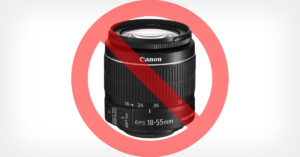
It's often said that "the best camera is the one that's with you," but one college photography instructor doesn't seem to agree: she has banned the students in her course from using kit lenses.
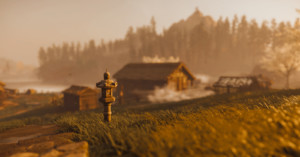
There’s an inherent freedom to photography as a creative outlet, especially when you’re capturing landscapes or urban environments. But the COVID era has seen many of us confined to our homes and cut off from the world around us.
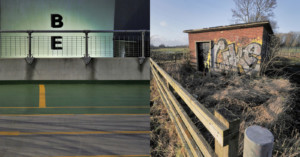
Should your photograph have a name? If not, why not? If so, then why? And does anyone really care? I’m of the opinion that it should always have a name, an identity, a personality. Well, all of mine at least. What you do with yours is entirely up to you. And as it should be.

Patrick Hall from Fstoppers and Pye Jirsa from SLR Lounge recently sat down for an in-depth conversation about how photography is changing in 2019. In a fascinating and insightful discussion that lasts almost 45 minutes, they ultimately try to tackle one question: is photography as we know it dying?
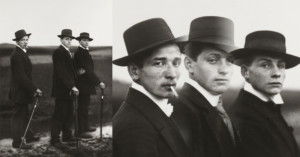
In 1914, German documentary photographer August Sander captured a famous photo titled Young Farmers, which shows three dapper men walking along the rural countryside. In this 9-minute video for PBS's The Art Assignment, famous author John Green dives deep into the photo and the story behind it.
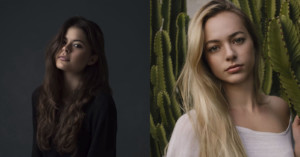
Trying to choose between a full frame camera and a crop sensor one? Here's a 10-minute video by photographer Sheldon Evans, who talks about the differences between the two and shares why he went from full frame to crop and then back again.
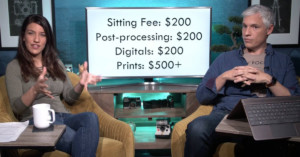
Figuring out how much to charge clients is a struggle shared by many photographers, particularly if you're trying live off the fruits of your craft. In this 30-minute episode of their Picture This Podcast, photographers Tony and Chelsea Northrup spend half an hour discussing this topic and sharing advice.
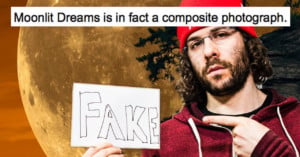
Photographers have been talking this month about best-selling landscape photographer Peter Lik's new photo, "Moonlit Dreams," pointing out that the image appears to be a "faked" composite instead of a single "real" exposure. It has since been confirmed that the photo IS a composite.
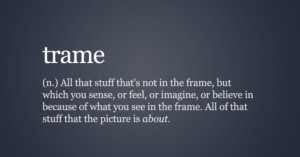
I feel that there's a word missing from our vocabulary, and this essay is the culmination of an effort to find such a word, to define it usefully, and to work through some of what it might mean.
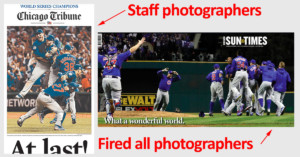
The Chicago Cubs finally won the World Series last night after 108-year drought. But what has some photojournalists talking are the cover photos published by two of Chicago's biggest newspapers, the Chicago Tribune and the Chicago Sun-Times.
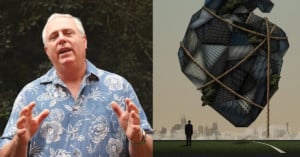
What's the place of digitally manipulated photo illustrations in the world of photography? The age-old discussion was rekindled this week after renowned Australian landscape photographer Ken Duncan spoke out, saying the Australian Professional Photography Awards (APPA) have been "hijacked by manipulators."
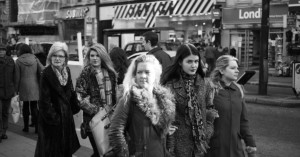
Street photography ethics are a touchy subject and I am not talking of street photography rules but rather more how photographers choose to behave. When shooting (candid) street photography in London or anywhere else, many street photographers seem to leave their values at home as soon as they head out to photograph strangers.

I’ve pretty much shot RAW all my life. There are so many benefits of shooting RAW in terms of how much flexibility you have with the files, as well as the raw data in the files. However, as time goes on, I’m starting to lean more towards shooting JPEG and realize the benefits of doing so.
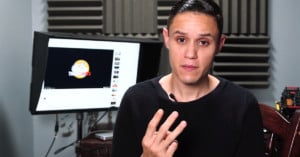
Should you ever give a client photos in exchange for "exposure"? That's the question discussed in this 6-minute video by NYC-based portrait and fashion photographer Jeff Rojas. He shares 3 things you can turn exposure into money.
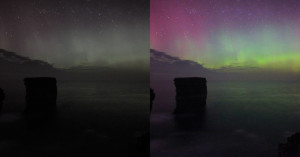
We’ve all seen those images over the past few years (popping up in our Facebook feeds or in the media) depicting spectacular displays of the Aurora Borealis or Northern Lights from Great Britain, Ireland or the lower 48 in the US. Regardless of the location, they’re pretty amazing images.
But beneath the wow-factor and thousands of ‘likes’ and ‘shares’ lurks a nasty little integrity issue. These aurora images may be photographic eye-candy, but many of them are pure high fructose corn syrup.
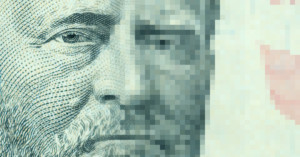
Photographers often harangue one another over pricing. Ironically, very few are willing to publicly disclose how much they charge for jobs. In economic speak, this leads to an inefficient market that has wide ranging pricing for the same output.
More to the point, no one knows what to charge, photographers don’t have an easy way to benchmark their rates and approach, and thus pricing information is guarded like gold. The cycle of opacity continues.
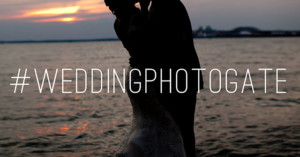
Photographers are up in arms this week over an online battle between a DJ and a wedding photographer. At the center of the controversy is the question of whether or not a DJ should be able to shoot and share wedding photos when the photographer has an exclusivity agreement with the bride and groom.
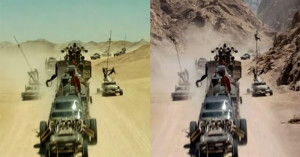
Popular YouTube filmmaker and VFX artist Freddie Wong released this video a couple of days ago that has a lot of people talking. It's titled "Why CG Sucks (Except It Doesn't)." Over the course of 7.5 minutes, Wong argues that computer generated visual effects often get a bad rap because it's the bad CG that everyone notices -- by definition, good CG is largely invisible to audiences.
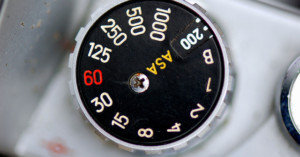
The word "speed" is used a lot in the world of photography equipment -- things like lens speed, film speed, and shutter speed. But speed is generally used to refer to how quickly something travels or operates per unit time, rather than a period of time itself. So is the term "shutter speed" a misnomer?
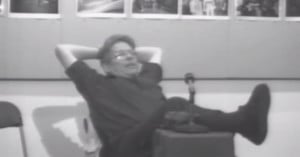
Garry Winogrand was one of the most notable and prolific American street photographers of the 20th century. He is known for capturing a vast record of what American life was like during the decades following World War II; in addition to his published works, thousands of his undeveloped and unseen rolls of film were discovered when he passed away in 1984.
In 1977, Winogrand was invited to speak to Rice Students about photography. Over the course of two hours, the photographer answered all kinds of questions and discussed a wide range of topics regarding photography, his work, and his thoughts.
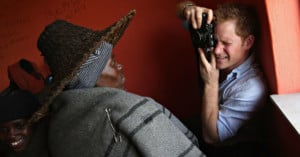
Guardian columnist Jonathan Jones is a master of sparking controversy in the world of photography. As you might remember, he's the guy who keeps arguing that photography is not art... a year after calling it "the art of our time."
His latest target is the above photograph showing Prince Harry shooting with a Fujifilm X100 during a trip to Lesotho in Africa. Jones argues that it's "as arrogant as any colonial portrait."

Back in 2012, the Republican Study Committee caused widespread debate over intellectual property law after publishing and then pulling a paper on copyright reform. Derek Khanna, the conservative staffer behind the paper, was fired by the committee shortly afterward.
He may have lost the platform afforded by the RSC, but Khanna is still pushing to have his views on copyright reform heard. His latest writings continue to cause quite a discussion on how copyright should be handled in the United States.
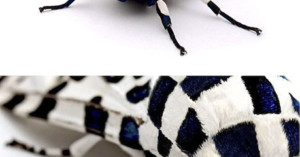
In the two photographs above, the bottom image is a photo-manipulation created using the top image. Are they completely separate works of art? What if we told you the second photo was created without the original photographer's permission and submitted to a contest as an original artwork? What if we told you it actually won?
That all actually happened last year, and the images are at the center of a copyright skirmish.

Want to turn your friend's Facebook photograph into a mug to sip your morning coffee from? A new service called Photos At My Door can help you do that. It's an app that can access any of your Facebook friends' public photographs and turn them into products ranging from photo prints and canvases to mugs and mouse pads.
If the thought of having your photos sold as commercial products without your permission makes you uncomfortable, you're not alone: the app is attracting criticism for it's apparently flippant views on photo copyrights.
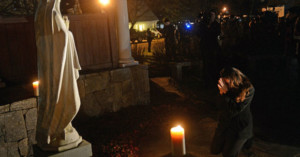
NPR sparked a debate regarding photojournalism, ethics, and privacy this past Monday after publishing a story titled, "What It Feels Like To Be Photographed In A Moment Of Grief" on its photography blog.
The discussion revolved around the photograph above, which AFP photographer Emmanuel Dunand captured in the evening after the school shooting in Newtown, Connecticut.